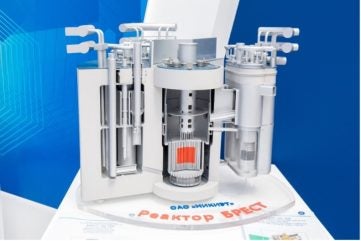
The start-up of Russia’s experimental lead-cooled Brest-OD-300 fast reactor is planned for 2027, the Director General of the Siberian Chemical Combine (SCC), Sergey Kotov told reporters. In future, the deployment of new generation of larger lead-cooled fast reactors is planned for Siberia, he added.
The Brest-OD-300 reactor is part of the pilot demonstration power complex (ODEK – Opitno Demonstratsionovo Energo-Kompleksa), which is being developed at SCC in Seversk under the Breakthrough (Proryv) project intended to demonstrate closed fuel cycle technology.
Brest (Bistrii Reaktor Estestvennoi-bezopasnosti co Svinstovim Teplonositelem – Fast Natural-safety Reactor with Lead Coolant) is a 300 MWe power unit. It is supported by a module for the production of mixed dense nitride uranium-plutonium (SNUP) fuel, as well as a module for reprocessing irradiated fuel. SNUP fuel is based on two key components – depleted uranium, which is a by-product of uranium enrichment for nuclear reactors, and plutonium, extracted from irradiated nuclear fuel.
A special feature of the project is the concept of Natural Safety. It assumes that the reactor itself and its fuel will be so safe that they will not require a large number of bulky technical systems and automation to ensure safety, thus simplifying the design and reducing the cost of such plants. The fuel fabrication module is almost completed and planned for commissioning this year; construction of the reprocessing unit is planned for 2025-2026 for commissioning in 2030.
“This year we must complete the commissioning work and obtain permission for pilot operation.…We are already working on these facilities with nuclear material.… Everything is going according to plan. Said Kotov. “There are difficulties with the manufacture of equipment, and it is clear that there are difficulties with sanctions. But we have a fairly powerful construction organisation and a general contractor. I think that we will succeed.”
“The reactor itself is naturally safe. Demonstrating this is its first task. The second task is to prove that nuclear energy is becoming a green in the sense that used fuel has been eliminated, said SCC Technical Director Konstantin Izmestiev. He noted that Brest is a pilot project, which is needed to test the technology, but similar larger installations of 1,200 MWe are already being developed.
Kotov confirmed that the development of larger 1,200 MWe are being considered for other sites in Siberia – the Tomsk Region and Krasnoyarsk Territory.






